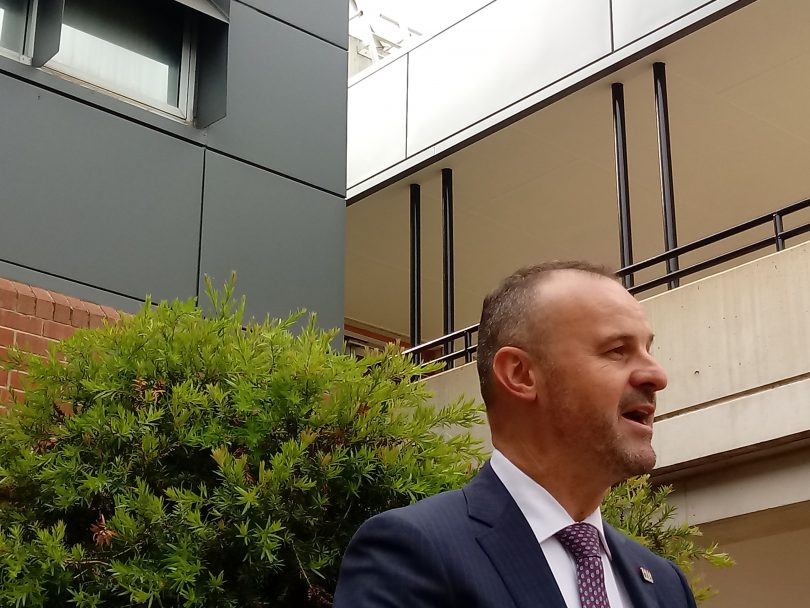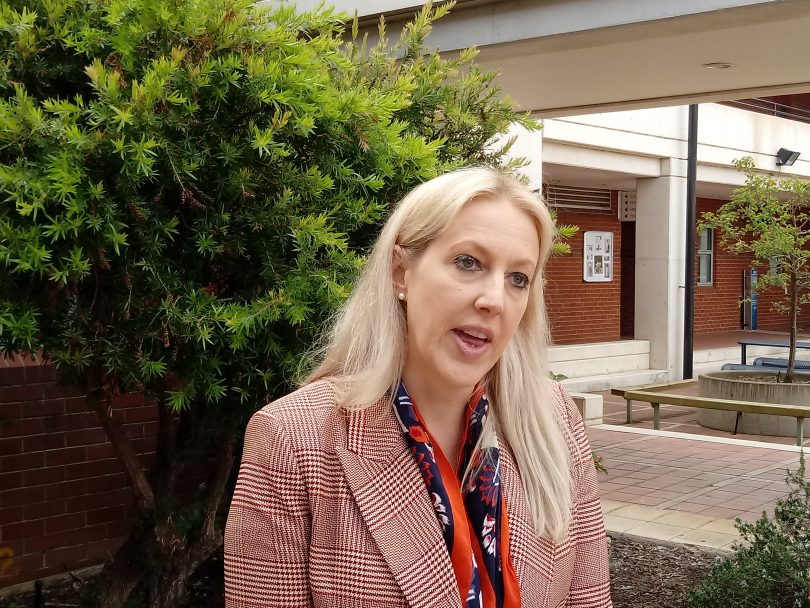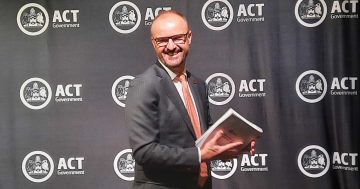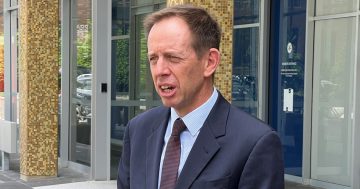
Chief Minister Andrew Barr at UC Lake Ginninderra College: the Wellbeing Framework will be Labor’s approach to government. Photos: Ian Bushnell.
Election battle lines have been drawn over the ACT’s new Wellbeing Framework, with Chief Minister Andrew Barr calling the Australian-first initiative a clear example of how Labor will approach governing and the Opposition rejecting it out of hand as a feel-good exercise.
The product of recent consultation with the ACT community, the Framework consists of 12 domains, with their own wellbeing indicators, considered to be the most important areas for measuring quality of life in Canberra. They will guide government decision-making, from the framing of budgets to policy development and spending priorities.
Launching the Framework, Mr Barr said it was designed so government could move beyond the traditional economic measures of performance to give it a much broader view of community needs, provide a holistic basis for decision-making and contribute to more collaborative, multi-agency approach to resolving issues.
But any chance of bipartisan support for the Framework and it surviving a Liberal victory in October has been quickly dashed with a short statement from the Opposition.
“The Liberals will make Canberra the best place to live, work and raise a family by focusing on better outcomes and lower taxes. The Government’s new framework is nothing but a feel-good exercise that lacks substance,” it said.
But Mr Barr argues the Framework will be all about outcomes, and it will be another point of difference come October.
“What I am being clear about now many, many months before the election is the Framework and approach to government that we will adopt if we are fortunate to be elected later in the year,” he said.
Mr Barr admitted there was always a risk governments of a different persuasion might not retain the Framework but that was not a reason not to do it.
“Once you put something down and prove that it will work it becomes harder for people to just throw it away without any thought,” he said.
But there are risks to wedding the Framework to the election timetable, bedding down a complex process before it may be ready.
Mr Barr said the Framework has been a couple of years in the making but the actual consultation only started last July.
The ACT Framework has been modelled on the New Zealand approach and the Government had worked with both the NSW and Victorian governments in its development.
While the Canberra Liberals might be dismissive, Mr Barr said other jurisdictions and countries were heading down this path.
The key will be the data the Framework and its indicators will provide, some of it from existing sources such as the Australian Bureau of Statistics, but new information will need to be collected and crunched.
“These indicators will provide a rich source of data for the community to measure our progress over years ahead,” Mr Barr said.
He said the Framework would contribute to the development of medium and long-term policy settings that ”would seek to shift the dial” in areas where the ACT was not performing as well the community would like.
Mr Barr pointed to the responses forced upon governments by disaster and disease as practical examples of how this new, holistic approach would be beneficial.
”I think you will see the value of wellbeing indicators at this time when governments locally, nationally and internationally are looking beyond just pure economic metrics to instigate either stimulus packages, or recovery packages or public health support,” he said.

Dr Emma Campbell: government will be held to account.
Mr Barr said the Framework would guide areas such as procurement so local firms will benefit, and infrastructure, which could be used to drive a ”multi-pronged outcome that improves wellbeing in a number of different indicators”.
He saw benefits in breaking down silos, agencies working together more and developing partnerships with the non-government sector to deliver services.
“It will force government and agencies to be more outcomes-focused,” he said.
Mr Barr acknowledged that clashes of interests would remain, such as between economic growth and the environment.
“The challenges don’t go away but this gives a framework with which to balance those competing priorities, gives a richer set of data to inform decision making and will give people a sense that when we are prioritising improving an outcome in an area we hope it would not have a negative impact on others,” he said.
“But not every policy decision can deliver every possible policy outcome that you want.”
The ACT Council of Social Service (ACTCOSS), which was closely involved in the development of the Wellbeing Framework, welcomed its release but also said government would be held to account if it did not adhere to it.
“This has resulted in a set of domains and indicators that the whole community can take ownership of and hold the Government accountable to,” CEO Dr Emma Campbell said.
But she would be disappointed with the Opposition’s stance, after saying she hoped the Framework would be embraced by all sides of politics.
“We welcome the attention that the ACT Wellbeing Framework gives to specific groups in our community whose wellbeing may be hidden by standard economic measures,” she said.
“ACTCOSS has long highlighted the disadvantage hidden behind the ACT’s high averages on most standard measures. The Framework pays close attention to inequality in all its forms.”
To learn more about the ACT Wellbeing Framework and its indicators, visit www.act.gov.au/wellbeing.




















